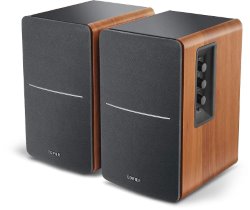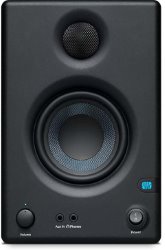Edifier R1280DBs vs. Presonus Eris E3.5
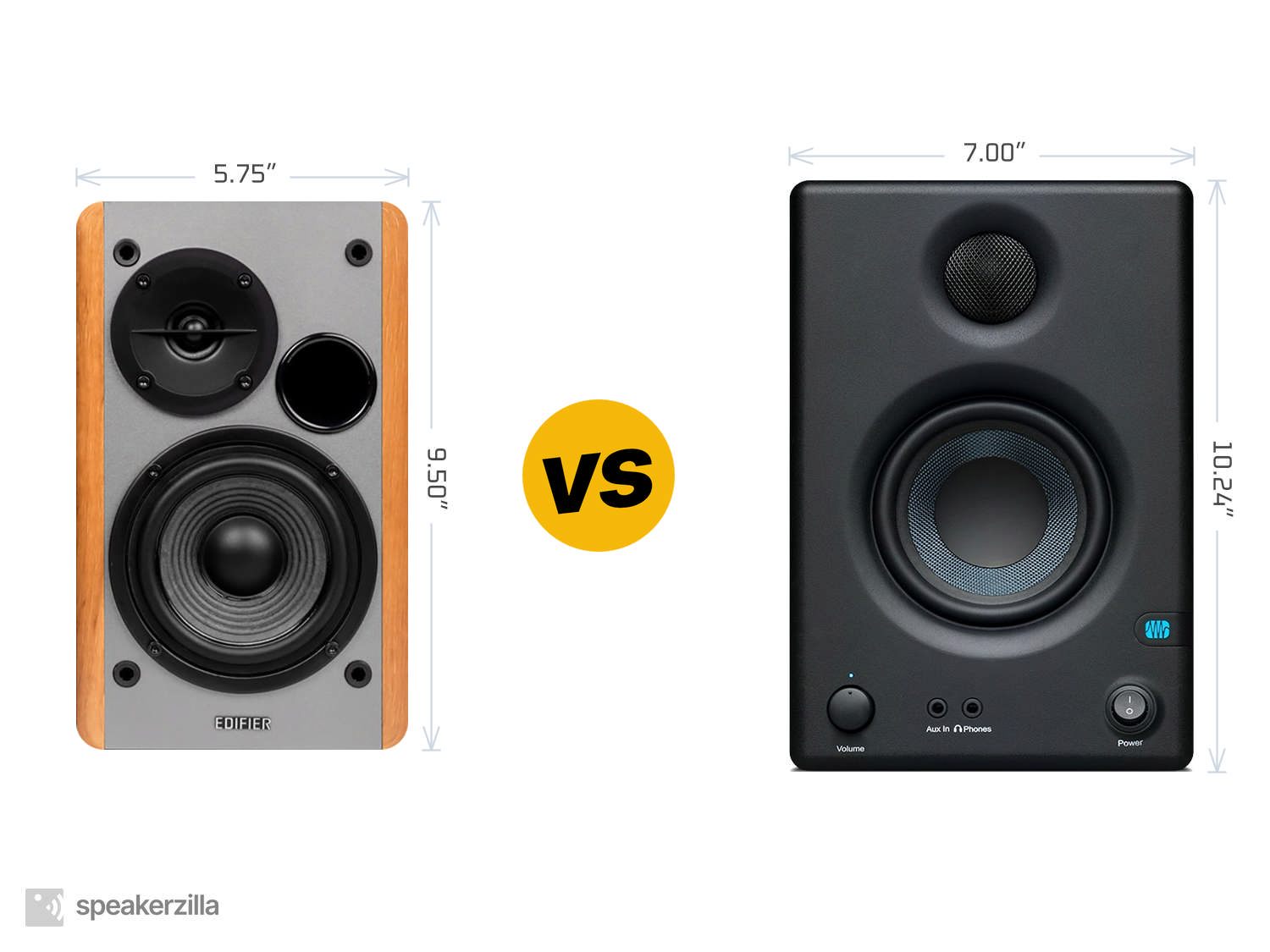
| Edifier R1280DBs Powered Bookshelf Speakers | Presonus Eris E3.5 3.5” Near Field Studio Monitor |
| MSRP | |
| $160 | $100 |
| Dimensions (H × W × D) | |
|
9.50” × 5.75” × 7.00” 241mm × 146mm × 178mm |
10.24” × 7.00” × 7.68” 260mm × 178mm × 195mm |
| Power Type | |
| Powered | Powered |
| Frequency Response | |
| 51-20,000 Hz | 80-20,000 Hz |
| ASR Score | |
| n/a | 1.5 |
| ASR Score w/Subwoofer | |
| n/a | 4.3 |
|
Amazon.com
|
Amazon.com
|
Key Takeaways
TLDR Summary: In the quest for superb desktop audio, the Edifier R1280DBs and Presonus Eris E3.5 offer compelling choices. The Edifier brings Bluetooth connectivity and a warmer, bass-friendly sound signature, ideal for casual, bass-heavy genres and multimedia enjoyment. In contrast, the Eris E3.5, with its studio monitor lineage, provides a more neutral and precise soundstage, catering to audio purists and creators seeking accuracy over coloration. Both offer excellent value, with the Edifier excelling in feature-rich convenience and the Eris in professional-grade clarity, leaving consumers to ponder their priorities: connectivity and full-bodied sound or analytical precision for mastering tracks.
Speaker Comparison
When considering the Edifier R1280DBs Powered Bookshelf Speakers and the Presonus Eris E3.5 Near Field Studio Monitors, one is immediately struck by the design philosophies that underpin each brand. Edifier's approach leans towards a more traditional aesthetic, often catering to home environments where speakers are part of the decor. On the other hand, Presonus favors a utilitarian look, perhaps as a nod to their studio heritage where function often trumps form.
Sound Quality: Clarity Meets Power
The sound quality of the Edifier R1280DBs is characterized by its warm and full-bodied profile, with a touch of emphasis on the low-end. This makes them particularly well-suited for genres like jazz, R&B, and electronic music where richness and depth are appreciated. The Presonus Eris E3.5, conversely, aims for a flat frequency response, a benchmark of studio monitors designed for accuracy and detail in mixing and monitoring applications. The Eris E3.5's deliver a more neutral sound, which can be quite revealing and unforgiving of poorly mixed tracks.
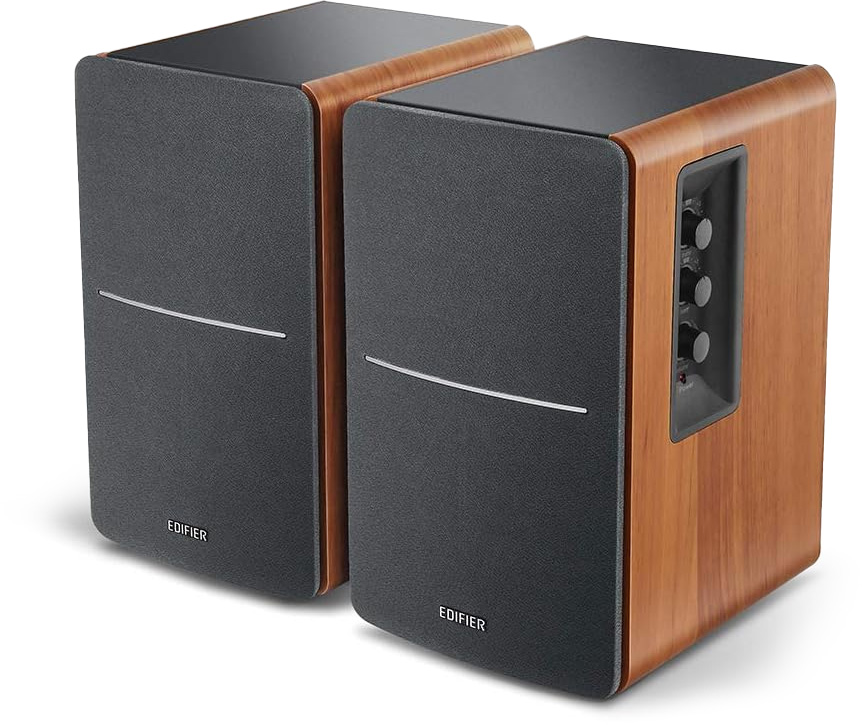
 (at Amazon.com)
(at Amazon.com)Connectivity and Features
Connectivity options are generous on the Edifier R1280DBs, featuring Bluetooth, coaxial, optical, and dual RCA inputs, making them versatile for a variety of audio setups. They also come with a remote control, adding convenience to daily use. The Presonus Eris E3.5, while not equipped with Bluetooth, do offer TRS and RCA inputs, along with a front-facing auxiliary input and headphone jack, allowing for ease of use when connecting a range of audio sources directly to the speakers.
Build Quality and Design
Build quality on both sets of speakers is commendable given their respective price points. The Edifier R1280DBs boast a wood veneer that lends them a classic, timeless quality, whereas the Eris E3.5's all-black vinyl laminate finish is sleek and modern, albeit more prone to showing dust and fingerprints. The compact footprint of both models makes them an easy fit for desktops and bookshelves alike, but it's the Edifier's design that tends to blend more seamlessly into a home environment.
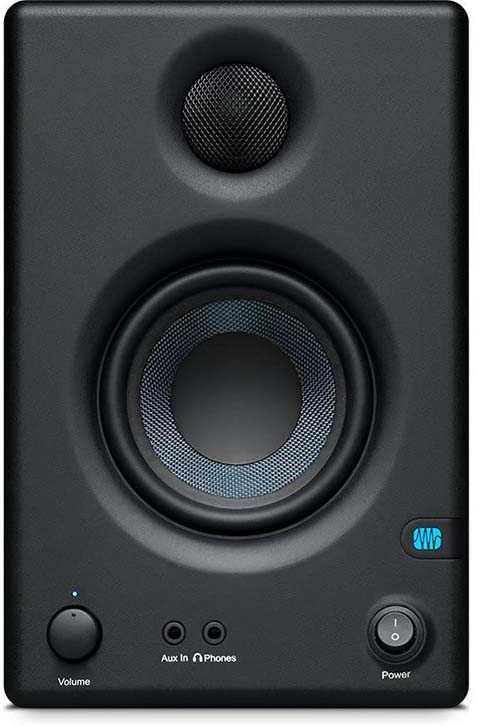
 (at Amazon.com)
(at Amazon.com)In practice, the Edifier R1280DBs are a plug-and-play solution, perfect for those who value convenience and a straightforward listening experience. With no need for an external amplifier, they shine as a hassle-free, all-in-one package. The Presonus Eris E3.5, while also self-powered, lean towards users who appreciate customization and tweaking; the rear panel offers acoustic tuning controls that allow for tailoring the sound to the listening environment. This level of control is a double-edged sword, potentially intimidating for casual listeners but invaluable for audio enthusiasts and professionals.
Compare to similar speakers
Value for Money
Value for money is an important consideration, and here both the Edifier R1280DBs and the Presonus Eris E3.5 score high marks. The Edifier offers a rich feature set with excellent connectivity options, while the Presonus brings professional studio monitor performance at a consumer-friendly price. Deciding between the two often comes down to use-case scenarios and personal preference in sound signature and aesthetics.
Ultimately, when deciding between the Edifier R1280DBs and the Presonus Eris E3.5, prospective buyers should consider their primary use case. The Edifier is ideal for casual listening and home entertainment setups, offering a warm, pleasing sound and seamless integration into any living space. The Presonus, with its studio pedigree, is better suited for those engaged in content creation, mixing, or any application where the accuracy of audio reproduction is paramount. Regardless of the choice, both sets of speakers promise an engaging auditory experience that belies their modest footprints.
- Edifier R1280DBs reviews and FAQs
- Presonus Eris E3.5 reviews and FAQs
Check Current Prices: |
|
|
Amazon.com
|
Amazon.com
|
Affiliate Disclosure: As an Amazon Associate, we earn from qualifying purchases.
